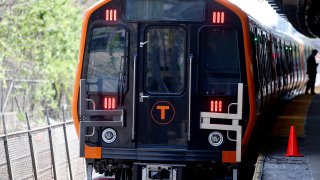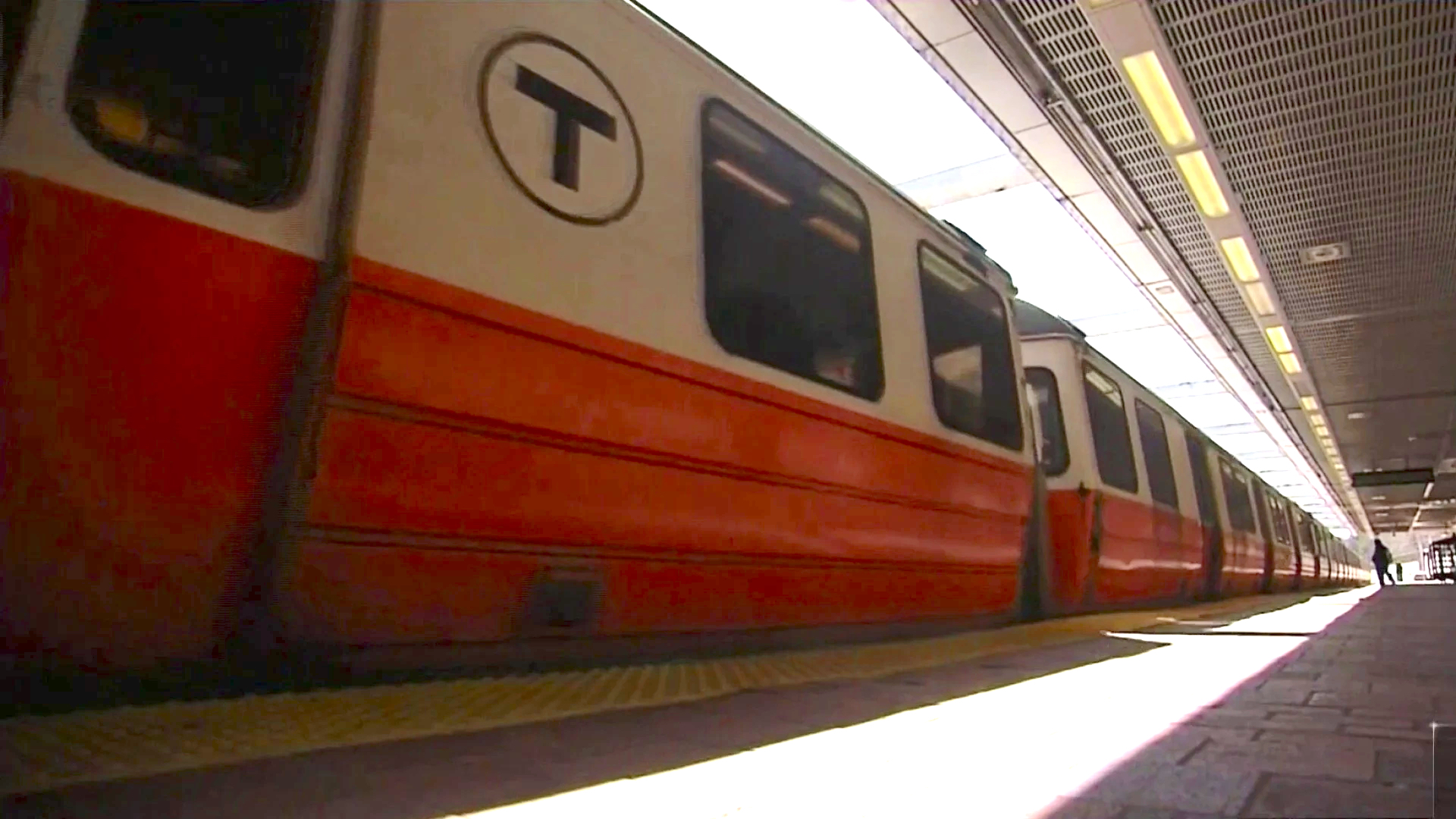
MEDFORD, MA – MAY 15: A new MBTA Orange Line car is pictured at Wellington Station in Medford, MA on May 15, 2018. The first new train is expected to enter passenger service late this year, with more trains following until the fleet is fully replaced by 2021. In the meantime, the new trains will add to the existing fleet, which should boost capacity by increasing the frequency of rush-hour service. (Photo by Jessica Rinaldi/The Boston Globe via Getty Images)
The outlook for the already-delayed transition to entirely new Orange and Red Line fleets continues to grow worse.
After previously delaying the project's targeted end date by at least a year, Chinese firm CRRC now expects it will need several more months to finish manufacturing subway cars for the MBTA's Red and Orange Lines as a result of nagging pandemic-related supply and labor issues.
Stream NBC10 Boston news for free, 24/7, wherever you are.
Massachusetts transportation officials emphasized when they announced the latest hiccup Thursday that they have not endorsed CRRC's revised schedule and would explore several options, including triggering a contract clause that would require the company to pay hefty damages for late completion, to mitigate another slowdown.
"It's important to make sure that the schedule that's presented is what they are telling us. There's a lot to be determined if they can achieve that given past performance, but most importantly, we have not accepted that," Transportation Secretary Jamey Tesler told the MBTA's board of directors. "Your and everybody's comments so far underscore that as a board, we expect better."
Get updates on what's happening in Boston to your inbox with our News Headlines newsletter.
The pair of contracts between the MBTA and CRRC, together worth more than $880 million, seek to replace the entire Red and Orange Line subway fleets with brand-new vehicles, a transformative project that officials have long pledged will increase the system's capacity and allow them to run trains more frequently.
CRRC was originally expected to deliver all 152 Orange Line cars by January 2022 and all 252 Red Line cars by September 2023. Two years ago, the MBTA announced the target completion dates were delayed until April 2023 for the Orange Line and September 2024 for the Red Line.
Now, MBTA Deputy General Manager Jeff Gonneville said Thursday, the Chinese locomotive giant projects it will deliver the last batch of Orange Line cars to the T in summer 2023 and the final Red Line cars in summer 2025. That would represent 17 months past the contract's due date for the Orange Line and 21 months late for the Red Line.
MBTA overseers voiced worry about the latest update from CRRC.
"We can't go on like this. We desperately need cars," said board member Mary Beth Mello. Board Chair Betsy Taylor asked to be included in the next quarterly meeting between MBTA senior leadership and CRRC executives, stressing to Gonneville that "they need to understand how deeply the board is concerned with the progress as you describe it."
CRRC is much further along on the Orange Line. The shells for all 152 cars have already been produced, and 78 are already in the MBTA's Wellington car house or actively providing passenger service, Gonneville said. For the Red Line, only 32 of the 252 car shells have been produced, 12 of which are complete and available for MBTA use.
"The position that CRRC has taken is they are focusing right now predominantly on the Orange Line fleet," Gonneville said.
Gonneville said most of the delays stem from production issues at CRRC's facility in Springfield, where final assembly takes place after initial manufacturing overseas. The western Massachusetts site has been grappling with low supplies of materials and with employee retention, both of which were exacerbated by the COVID-19 pandemic.
Quality assurance is another factor that has slowed progress, Gonneville said, and one that might require a change in approach to hit even the revised timeline from CRRC.
"We are finding that we are identifying issues through inspection, and those issues then disrupt the efficiency of the production flow, because CRRC has to go back, fix or correct those quality issues, which then disrupts the flow of production in the Springfield facility itself," he said. "It's really because of this that we, the project team, the MBTA, does feel as though CRRC does need to make some changes to their manufacturing in Springfield really to be able to even meet these dates they're projecting."
Gonneville detailed several steps the T has taken or will take to manage the situation. MBTA representatives and staff are embedded at the Springfield facility, and the agency has also audited each production station to highlight possible improvements CRRC can make.
Under the contract, CRRC could face damages of $500 per car per day delivered past the due date. It's not yet clear exactly how that would get calculated, but the clause looms as a possible major charge to recoup some of what the T spent or as a powerful stick to usher CRRC toward faster work.
"We have strong contractual language that does protect the agency, at least from a financial standpoint. That is financial leverage to ensure that we in the end will get the cars that we need," Gonneville said.
Still, he stressed that the MBTA's leadership team "want(s) to continue our partnership with CRRC."
"Certainly, I think all of us can agree that the impacts of COVID-19 and other things potentially could be out of the control of CRRC, and those are the things we will engage in a conversation with CRRC when the time does come," Gonneville said.
The MBTA awarded the manufacturing contracts in 2014, during former Gov. Deval Patrick's final year in office. If CRRC's projections hold true, the entire effort will not wrap up until halfway through the term of the successor to Patrick's successor.
Since the first new Orange Line car began carrying passengers in 2019, the vehicles have faced a string of issues and have been pulled from service several times while MBTA crews identified and then fixed manufacturing issues.
The Springfield site has about 250 production and manufacturing employees, about 180 of whom work on MBTA trains, Gonneville said. He added in response to a board question that those employees typically work the first shift Monday through Friday and "are not working around the clock at this point."
Other workers at the facility are working on projects for Los Angeles's Metro, and in the spring, they will also start work on cars for Philadelphia's SEPTA, according to Gonneville.
"That's very scary, Jeff, when you get into that," MBTA board member Robert Butler interjected. "Everybody's having trouble getting people as well as us at the T. That's scary right there."



